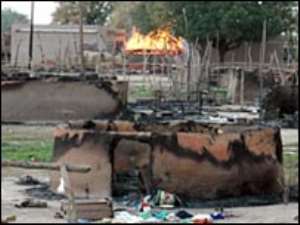
The kidnappers of three foreign aid workers in Sudan's Darfur region have demanded a ransom, say officials.
The Medecins Sans Frontieres staff were abducted on Wednesday along with two local staff who were later released.
The kidnappings come after Sudan ordered the expulsion of 13 aid groups, including the French and Dutch chapters of MSF, earlier this month.
They were told to leave after President Omar al-Bashir was indicted by the International Criminal Court (ICC).
He is accused of war crimes and crimes against humanity in Darfur.
The abducted staff were working for MSF's Belgian branch.
Local media quoted North Darfur governor Osman Kebir as saying he had spoken to the kidnappers and the aid workers by telephone.
"Negotiations with the abductors are progressing well and could result in the release of the victims soon," the Sudanese Media Centre quoted Mr Kebir as saying.
"The kidnappers demanded a financial ransom and have promised that they are not interested in violence," he said.
Sudan's government has condemned the kidnapping as "unacceptable" and an "act of lawlessness".
MSF says it is now withdrawing all its sections' medical teams from Darfur, leaving only a skeleton team to follow the case of those abducted.
"MSF is extremely worried both for our abducted colleagues and for the populations that MSF teams had been providing medical aid to," according to a statement from the medical charity.
Notorious area
The aid workers were taken at gunpoint from the MSF Belgium office at Saraf Umra, some 230km (143 miles) west of the North Darfur capital el-Fasher, on Wednesday evening.
MSF said the abductees included a Canadian nurse, an Italian doctor and a French co-ordinator.
Two Sudanese staff were also taken but have since been freed.
MSF said it had no further information and would not make any more comments in order to safeguard the security of its staff.
The area where the aid workers operated is notorious for banditry, the BBC's East Africa correspondent Karen Allen says.
But the timing of the kidnapping will inevitably prompt questions about whether it was a political act, she adds.
Khartoum reacted with anger at the 4 March ICC warrant for President Bashir, describing it as a "neo-colonialist" move to destabilise the country.
Following the indictment, he expelled 13 aid agencies accusing them of taking "99% of the budget for humanitarian work themselves, and giving the people of Darfur 1%" - charges the groups deny.
Mr Bashir also threatened to kick out more foreign workers if they did not obey Sudan's laws.
The United Nations has said expelling the humanitarian groups puts more than one million lives at risk.
African and Arab countries, along with China and Russia, have been pressing for the ICC warrant to be delayed, fearing it will damage peace efforts in Darfur.
But the US, UK and France have said there is no reason to halt proceedings.
The UN estimates that 300,000 people have died and 2.7 million been displaced, since black African rebels took up arms in 2003 against the Arab-dominated regime demanding a greater share of resources and power.
Mr Bashir has always denied that his government helped mobilise the Janjaweed militias accused of the worst atrocities against civilians in Darfur.




 We’ll protect state wealth from opaque deals – Prof Jane Naana
We’ll protect state wealth from opaque deals – Prof Jane Naana
 Mauritania president says running for second term in June polls
Mauritania president says running for second term in June polls
 I won't ever say I was a mere driver’s mate' — Prof. Opoku-Agyemang
I won't ever say I was a mere driver’s mate' — Prof. Opoku-Agyemang
 2024 polls: 'EC struggling to defend credibility'— Prof. Opoku-Agyemang
2024 polls: 'EC struggling to defend credibility'— Prof. Opoku-Agyemang
 Akufo-Addo gov't's 'greed, unbridled arrogance, unrestrained impunity, sheer dis...
Akufo-Addo gov't's 'greed, unbridled arrogance, unrestrained impunity, sheer dis...
 Election 2024: Ghana needs an urgent reset, a leadership that is inspiring – Ma...
Election 2024: Ghana needs an urgent reset, a leadership that is inspiring – Ma...
 Partner NDC to rollout a future of limitless prospects – Prof Jane Naana Opoku-A...
Partner NDC to rollout a future of limitless prospects – Prof Jane Naana Opoku-A...
 NPP will remain in gov’t till Jesus comes — Diana Asamoah
NPP will remain in gov’t till Jesus comes — Diana Asamoah
 Sunyani Technical University demands apology from former SRC president over sex-...
Sunyani Technical University demands apology from former SRC president over sex-...
 'Dumsor' was resolved by Mahama but ‘incompetent' Akufo-Addo has destroyed the g...
'Dumsor' was resolved by Mahama but ‘incompetent' Akufo-Addo has destroyed the g...
